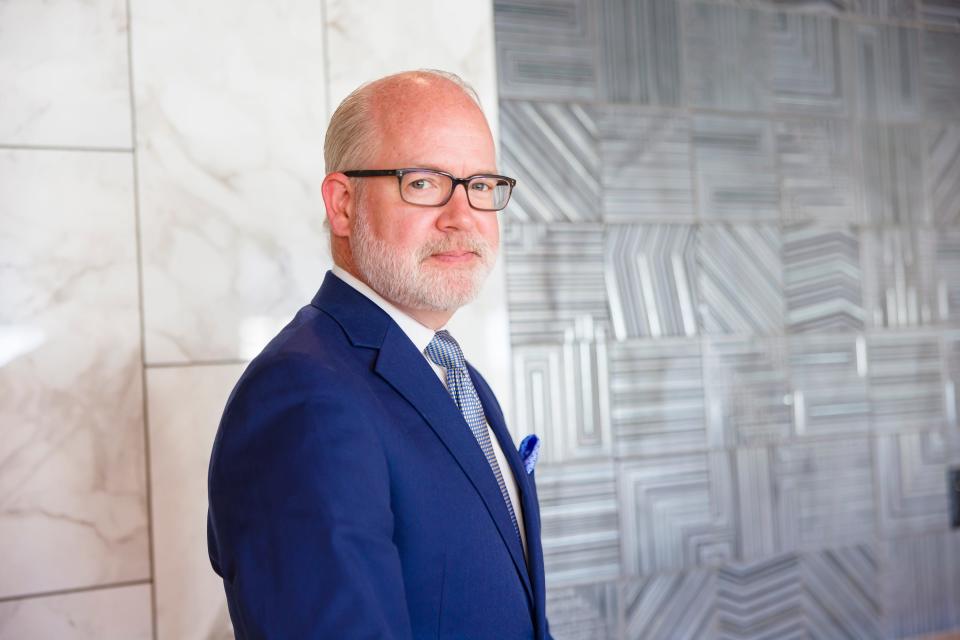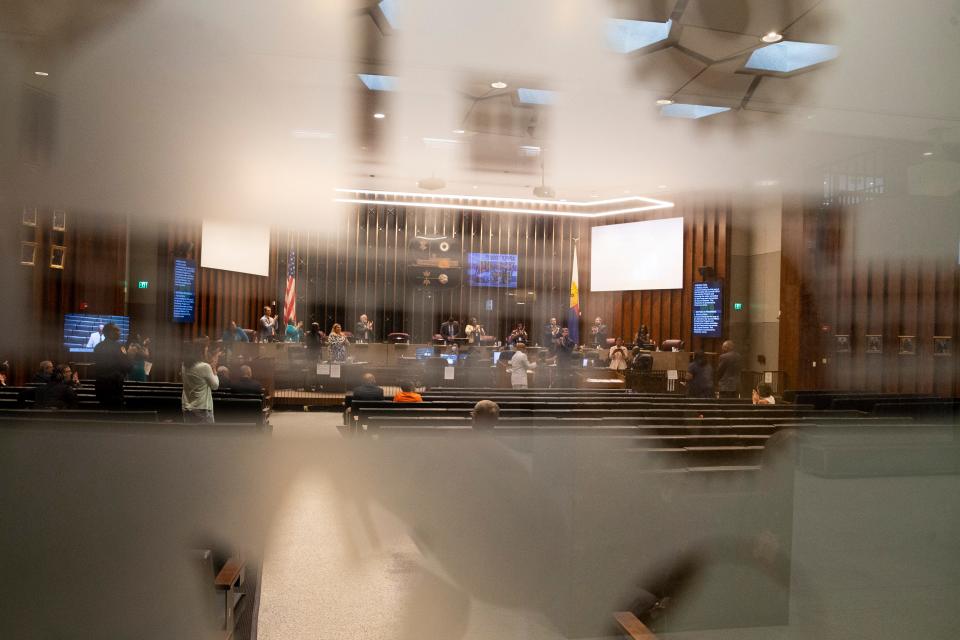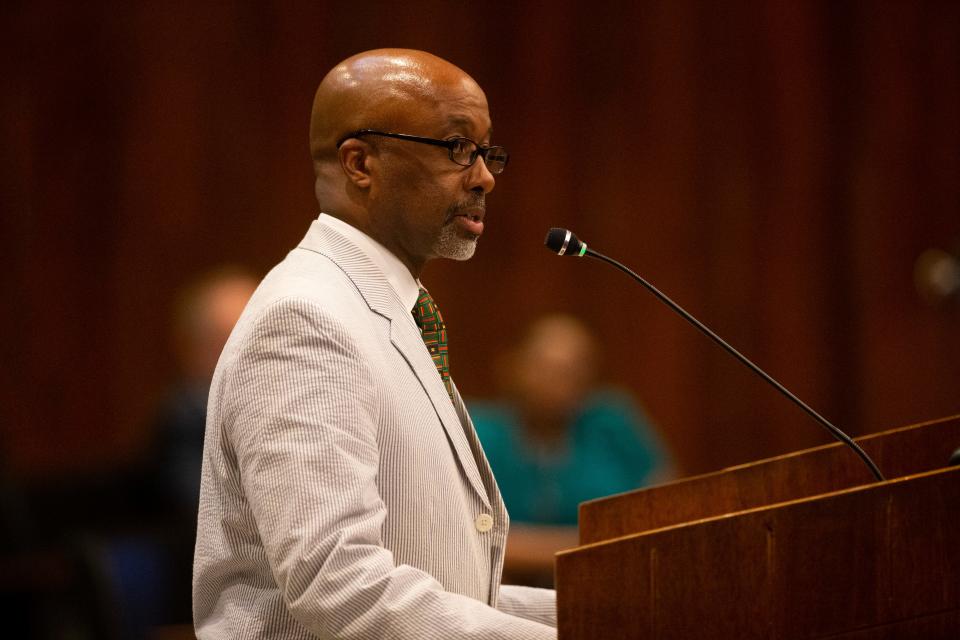With transformative fiber initiative, Memphis looks to Chattanooga for broadband inspiration
In moving toward a vast initiative that is slated to provide broadband internet to 85% of Memphis households — including 85% of low-income households — the city of Memphis is looking to Chattanooga for inspiration.
The city is also bracing for a fight with telecommunications companies, much like the fight that occurred when Chattanooga first announced a plan to offer gig-speed internet communitywide through fiber-optic cables.
There are some key differences between the two cities: In Memphis, the city is not proposing to offer fiber through a municipality-owned utility. Rather, it is proposing a partnership with private companies that is intended to pave the way to widespread access to fiber internet.
In 2010, Chattanooga began to offer gig-speed internet communitywide through EPB of Chattanooga, its city-owned utility. In 2015, it became the first city to offer a residential, 10 gigabit-per-second plan. Then, in 2022, the city announced a 25-gigabit internet service available citywide.
10 gigabits per second is enough to download a two-hour high-definition movie in three seconds, according to Quartz.
"I think what has been lifechanging about it has really been the new companies and investments that have been made in Chattanooga," said Katie Espeseth, vice president of new products at EPB. The "best thing that could happen is if everyone in the country had access to this type of infrastructure."
The impact on Chattanooga has been profound: A study found that the economic value of the fiber-optic infrastructure exceeds $2.69 billion, surpassing the costs of the project by over $2.20 billion. And, it has created 9,516 jobs over the 10 years included in the study period, roughly 40% of all jobs created in the county during that time.
“Providing every home with top quality internet service is as important today to the quality of life and economic development in Memphis as providing every home with electricity 100 years ago,” said Memphis Mayor Jim Strickland in a recent briefing for the Memphis business community.
Strickland is proposing the plan during his last three months in office and has said it has the potential to transform the city.
Becoming a 'gig city'
In Memphis, there are two parts to the plan to become, like Chattanooga, a “gig city.”
The first part is an ordinance currently before the Memphis City Council that will create a new telecoms company classification for companies that commit to developing fiber access to 60% of the city, including 60% of low-income households. It includes annual right-of-way fee waivers and reduced permitted fees. The ordinance has passed its first reading with the Memphis City Council but requires three before full approval.
The second component is a contract with Blue Suede Networks, which is partnering with Meridiam, a global investor.
More: Memphis introduces new broadband plan, hopes to expand access to thousands of residents
That contract does not need to be approved by the Council but will be finalized after the separate ordinance is passed. It will include $15 million from the city (using American Rescue Plan Act dollars) to Meridiam and Blue Suede Networks, which will provide 36 strands on the backbone and 12 strands of fiber throughout the city to the city government.
The city is also planning to spend $3.5 million on city staffing for implementation and $3.5 million for connections to low-income households. That $7 million comes from Accelerate Memphis funding.
Although the ordinance only requires companies to provide fiber to 60% of Memphis’ population, Blue Suede Network in partnership with Meridiam is planning to invest $700 million in Memphis to build out the fiber-optic infrastructure required, including providing fiber to the home and businesses of at least 85% of residents.
The initiative could be transformational for Memphis.
“You will probably be the best-wired city in America because you will have fiber everywhere,” said Joanne Hovis, president of CTC Technology & Energy, who is working as a consultant for Memphis. “You’re effectively changing the math. You are using your powers as a city to change the equation” by offering incentives that are of interest to the private sector.
Currently, Memphis ranks 90th in download speed and 60th in upload speed. It is 99th out of 100 in latency, the measure of how quickly a device gets a response after a request has been sent, according to the city.
Close to 72% of the city —more in low-income neighborhoods — does not have access to fiber-based high-speed internet, according to the city.
Having high-speed internet will allow the city to install more cameras and traffic signals, using fiber in every city-owned building. But it will also allow everyday residents to meet the rising demand in speed needed for telehealth, work-from-home jobs, virtual school, entertainment and much more.
While the contract is with Meridiam and Blue Suede Networks, the ordinance will allow the reduced and waived fees to apply to any high-speed broadband network that agrees to the terms.
In Chattanooga, the fact that the city already had communitywide fiber became particularly important as COVID-19 hit. People could work from home, learn at home, use telemedicine and more.
The city launched the EdConnect program, which signed up families with children on free or reduced lunch plans at school for fiber. They didn't have to lay additional fiber: It was as simple as adding a new customer, Espeseth said.
'Revolutionary' but not without pushback
Ted Townsend, president and CEO of the Greater Memphis Chamber, said he expects the ordinance to bring healthy competition to the city, something Strickland has said will result in lowered rates and better speeds.
“We see it as an economic development tool,” Townsend said. “Again, everything we do is about attracting investment capital in our community. So, we're very excited to support this and will continue to be supportive of any private sector partner who's willing to come in here and deploy their capital, where at the end of the day, our region becomes stronger and more competitive.”

Hovis called the model proposed in the ordinance “revolutionary.”
It’s particularly revolutionary when recent federal investment in fiber has gone primarily to rural areas, while private funding has gone to wealthier cities and suburbs.
Private investors are not going into urban cores, she said.
“What the mayor and his team have developed is a formula for attracting private investment to places where it wouldn’t otherwise go and to do so in a way that is not only pro-business but a plus from the public interest standpoint because it will eliminate the digital divide," Hovis said.
But as in Chattanooga, Memphis has already faced pushback from at least one telecom company.
In Chattanooga, Comcast and AT&T sued when the city began its fiber initiative, lawsuits the city won. An industry body of telecom companies paid for advertisements that urged residents to call city hall to oppose the plan.
One 2016 article in The Nation said that EPB ended up taking tens of thousands of customers from Comcast in Chattanooga, with Comcast offering “service that is about 85% slower at twice the price.”
In Memphis, a political action committee registered in the Washington, D.C. area named A Better Tomorrow for Tennessee has sent numerous texts to Memphians even before Strickland’s proposal was introduced, calling the broadband plan "costly" and "unneeded.” The PAC has also had phone calls made to residents, with the caller asking if they can patch the resident through to the City Council offices to oppose the plan.
It is unclear exactly who is paying the PAC for those advertisements. Asked whether Comcast was affiliated with the PAC, Comcast officials said the PAC is an "independent organization" and called it a “like-minded organization.”

But openly during City Council meetings, Comcast has fought back against the fiber plan, saying the ordinance was written to favor “just one company” and “eliminates competition.”
Comcast did not apply to the request for proposals issued last year and ultimately granted to Blue Suede Network, and the service it offers in Memphis is not the same as fiber.
In Memphis, Comcast offers hybrid fiber coaxial, which combines optical fiber and coaxial cable. In this case, the coaxial cable in Memphis is aged and has significant limitations when it comes to upgrading to higher speeds, said Jay Rolls, chief technology officer at Broadband Success Partners, another consultant to the city of Memphis.
Hybrid fiber-coaxial is “beginning to reach the end of its lifespan,” Rolls said, while “It’s unfathomable how much capacity fiber has.”
More: Memphis City Council runoffs: Early voting has started. Here's what you need to know
Where Comcast is building new networks, such as in rural areas, they are building fiber. In Memphis, however, Comcast is working with a “very good network (with) very good speeds,” but is using infrastructure built in the late 1970s and early 1980s, Rolls said.5
“We’re starting where Comcast is striving to be,” Rolls said.
'The direction in which the world is going'
On Oct. 24, Comcast officials arrived at City Hall to defend their offerings, asking for an ordinance that is “technologically and competitively neutral to all providers,” in the words of John Farris, a local attorney representing Comcast.
Comcast touted its 10G network, the work the company has done to provide internet to students during the COVID-19 pandemic and its history in Memphis.
In a statement to The Commercial Appeal, a Comcast representative said they want Memphis to incentivize “all companies.”
“As currently written, the Smart City Fiber Access ordinance is so narrow as to only apply to one company,” Comcast officials wrote. “If other companies meet the ordinance’s broadband speed requirements and meet the ordinance’s broadband deployment requirements for residences, businesses, and income-constrained households, those companies should be afforded the same benefits outlined in the ordinance.”
Council Attorney Allan Wade has warned that the ordinance could lead to “potential litigation” and has held at least two attorney-client sessions with council members. After one session, Council Chairman Martavius Jones said anything pertaining to the contract with Meridiam would be taken out of the ordinance.

But when pushed to say what part of the ordinance was discriminatory against other companies, Farris could only point to the fact that the city plans to pay $15 million to Blue Suede Meridiam for the 12 strands of fiber it will provide to the city.
That, Jones said, will be taken out of the ordinance, making it clear the ordinance can apply to any company willing to offer fiber to 60% of the city.
Wendy Harris, the city’s chief information officer, has described fiber as “future-proof.” There is no limit to increasing speeds from one gigabit to 10 to 25, just as Chattanooga has done, or much more.
In Chattanooga, they haven't needed to change out any cables. The same fiber-optic cables used when they started in 2009 have been able to accommodate increased capacities.
“The more fiber that we have, the more connectivity we have,” Harris said. “Fiber is the most secure, the most robust, and it’s just the direction in which the world is going.”
Katherine Burgess covers Memphis City Government and religion. She can be reached at katherine.burgess@commercialappeal.com or followed on X, formerly known as Twitter, @kathsburgess.
This article originally appeared on Memphis Commercial Appeal: Here's how Memphis wants to expand broadband to 85% of city residents

